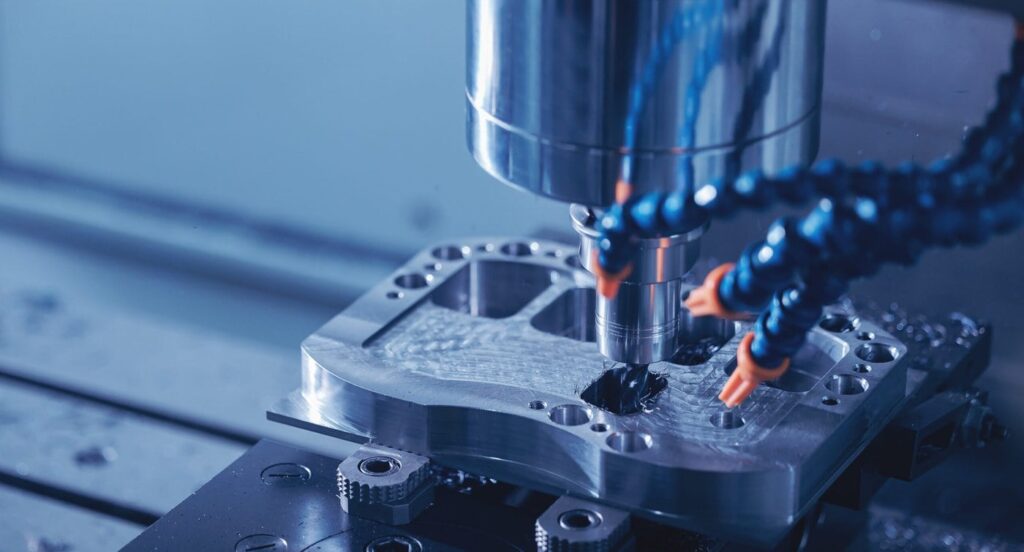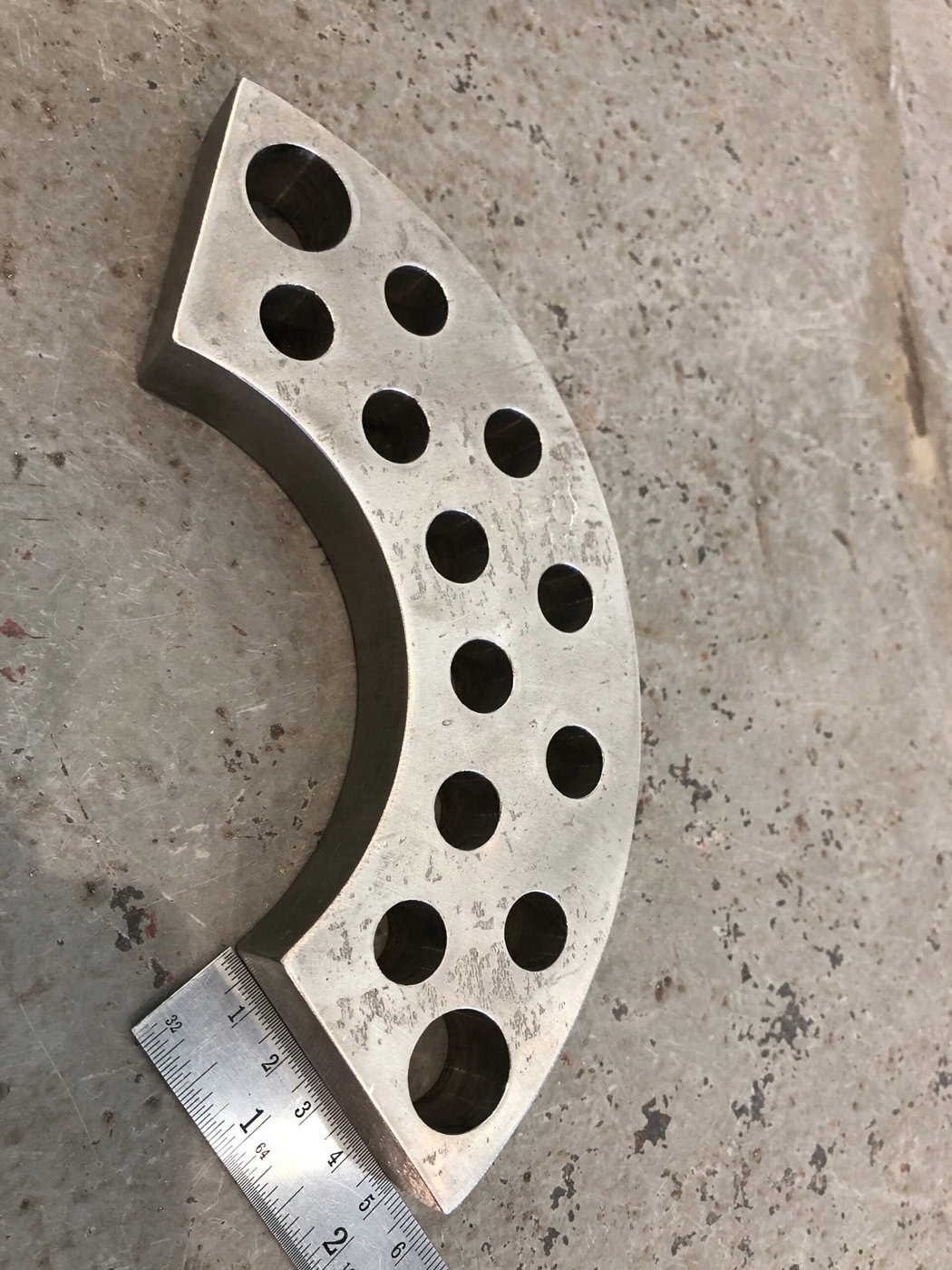Inconel is a high-performance alloy known for its exceptional strength and resistance to extreme environments. It’s a cornerstone material in industries like aerospace, automotive, and energy. At Rapid Axis, we specialize in precision CNC machining of Inconel, delivering high-quality parts tailored to your needs.
This article explores Inconel’s properties, machinability, challenges, and applications, as well as how our expertise ensures optimal results.
What Is Inconel?
Inconel is a family of nickel-chromium-based superalloys renowned for their exceptional performance in extreme environments. As an alloy, it’s a combination of materials, unlike aluminum or steel which can be found as a pure piece of metal.
Inconel is a manufactured material, engineered to maintain their strength, corrosion resistance, and structural integrity under high temperatures and mechanical stress, making them indispensable in demanding industries.

Key Properties of Inconel
People tend to use Inconel within a number of specific applications, due to the unique properties of this superalloy:
- High Temperature Resistance: Inconel retains its strength and resists oxidation at temperatures exceeding 1,000°F (538°C), making it ideal for aerospace and power generation applications.
- Corrosion Resistance: Its superior resistance to acids, salts, and other corrosive agents ensures longevity, even in harsh chemical or marine environments.
- Durability and Toughness: Inconel withstands heavy loads, high pressures, and repeated stress cycles without deformation or fatigue.
Common Forms of Inconel
The different forms of Inconel are pretty similar to alloys like 6061 aluminum or 304 stainless steel, you can find Inconel in forms such as bars, sheets, plates, and tubes.
As a material, it can be used in diverse manufacturing applications such as precision CNC machining, forging, and casting.
Is Inconel Difficult to Machine?
Yes, Inconel is considered one of the more challenging materials to machine due to its unique properties. In our experience, it’s one of the materials that people only use when they need to meet very specific requirements within their application. In other words, it’s not a general material that you would use for any old standard part.
Its high strength, toughness, and tendency to work harden during cutting make it demanding on both tools and equipment. However, with proper techniques and expertise, high-quality machining is achievable. With that said, never ask a machine shop to fabricate an Inconel part unless they have previous experience working with this superalloy.
What Is the Machinability of Inconel?
The machinability of Inconel is rated as poor compared to other metals. Factors affecting its machinability include:
- Work Hardening: Inconel hardens rapidly during cutting, which increases tool wear and machining difficulty.
- Thermal Conductivity: Low thermal conductivity means heat generated during machining stays in the cutting zone, further challenging tools and processes.
- Tool Wear: The material’s hardness accelerates tool wear, requiring our team to use specialized tooling and cutting strategies.
Despite these challenges, our experienced machinists at Rapid Axis can deliver precise and reliable results.
What Makes Inconel Machining Challenging?
We mentioned that Inconel is a nightmare to machine for a number of reasons, but let’s look at some of the more challenging material properties of Inconel. With our experience working with this material, we know all of the common pitfalls and how to avoid some of the bigger issues during manufacturing.
Work Hardening During Machining
Inconel’s tendency to work harden during cutting leads to increased tool wear and difficulty maintaining tolerances. Using sharp tools and optimized cutting parameters is essential to mitigate this effect.
Heat Generation
Inconel’s low thermal conductivity causes heat to concentrate at the cutting edge, potentially damaging tools and reducing part quality. Proper cooling techniques are crucial to dissipating heat effectively.
Accelerated Tool Wear
The hardness and toughness of Inconel significantly increase wear on cutting tools. This requires frequent tool changes, higher-quality tooling, and precision monitoring. Our machinists know to pay close attention to the cutting tools to change them out before they get too dull.
What are Essential Tools for Effective Inconel Machining?
Machining Inconel requires specialized tools, techniques, and equipment due to its toughness and tendency to generate heat during the cutting process. The right combination of cutting tools, coolants, and cutting parameters is essential for achieving consistent results.
By selecting the right tools, coolants, and cutting strategies, machinists can overcome Inconel’s challenges and produce high-quality parts.
Cutting Tools
Carbide Inserts: These are our go-to choice for Inconel machining due to their hardness, heat resistance, and ability to handle the alloy’s toughness.
Ceramic Tools: Ideal for high-speed applications, ceramic tools can withstand extreme heat and maintain cutting performance longer than traditional materials.
Coated Tools: Coatings like TiAlN (titanium aluminum nitride) enhance wear resistance and reduce friction, extending tool life during prolonged machining cycles.
Coolant Options
High-Pressure Coolant Systems: These systems effectively remove heat from the cutting zone, reducing thermal damage to tools and improving surface finish.
Oil-Based Coolants: These offer superior lubrication, minimizing friction and the risk of galling while enhancing chip evacuation.
Flood Coolants: Used to maintain stable temperatures and reduce work hardening by preventing excessive heat buildup.
Cutting Parameters
Cutting Speeds: We have to use lower cutting speeds to reduce heat generation and prolong tool life, which translates to longer cutting times.
Feed Rates: Moderately high feed rates minimize work hardening and ensure efficient material removal.
Depth of Cut: Consistent depths prevent uneven stress on tools and maintain dimensional accuracy, so try to design your features with the same depth to keep things simpler in the machine shop.

Different Grades of Inconel
Inconel is available in multiple grades, each optimized for specific applications and environmental conditions. Understanding these grades helps ensure the right material is chosen for your project.
Inconel 718
Known for its high tensile strength, corrosion resistance, and weldability, Inconel 718 is a versatile choice for critical applications.
Commonly used in aerospace for turbine blades, jet engine components, and structural parts due to its ability to withstand extreme temperatures and stress.
Inconel 625
Valued for its exceptional corrosion resistance and high strength, Inconel 625 performs well in environments exposed to saltwater, chemicals, and high temperatures.
Ideal for marine applications like deep-sea drilling equipment and chemical processing components that require resilience in corrosive environments.
Inconel 600
Designed for resistance to oxidation and scaling at elevated temperatures, Inconel 600 also offers good corrosion resistance in various chemical environments.
Widely used in heat exchangers, industrial ovens, and furnace components where high temperatures are a constant.
Choosing the Right Grade
The choice of Inconel grade depends on factors such as operating temperature, exposure to corrosive elements, and mechanical stress requirements. Consult with an experienced manufacturer like our team at Rapid Axis to ensure the material selection aligns with your application’s demands.
Common Applications of Inconel
Inconel’s unique properties make it indispensable in several high-performance applications:
- Aerospace: Turbine blades, exhaust systems, and structural components.
- Automotive: Turbocharger housings and exhaust manifolds.
- Energy: Nuclear reactor components, heat exchangers, and gas turbines.
- Marine: Components for deep-sea drilling and saltwater environments.
- Industrial: Chemical processing equipment and pressure vessels.
Conclusion
Machining Inconel presents unique challenges, but with the right expertise, tools, and techniques, it is possible to achieve precision and durability. At Rapid Axis, we specialize in CNC machining of Inconel, ensuring that your parts meet the highest standards of quality and performance.
Whether you need aerospace-grade components or industrial parts, our team is ready to assist. Contact us today for a free quote and experience our dedication to excellence in manufacturing.
